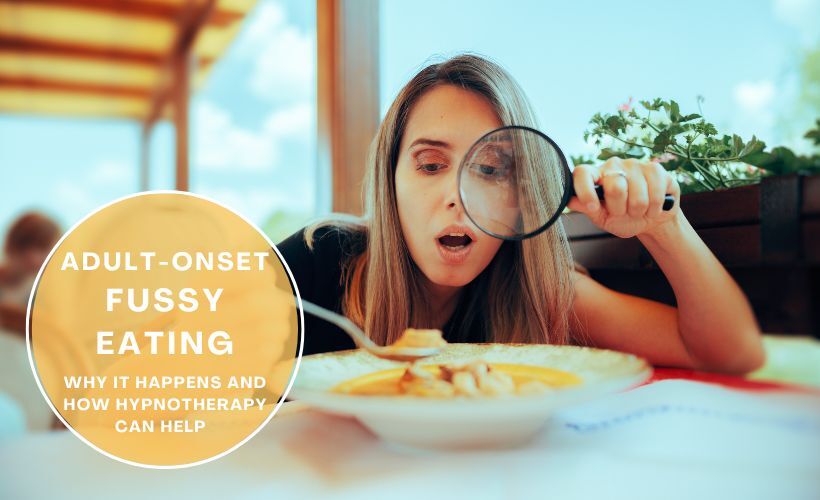
For years, my focus has been on helping children and families overcome fussy eating through prevention and early intervention. I’ve seen time and again that when we create supportive mealtime environments—through parent coaching, structured routines, and sometimes gentle hypnotherapy—children can develop a healthy, curious, and varied relationship with food.
The goal is to address challenges early, before patterns become deeply ingrained, and to give families the tools they need to build confidence and trust around eating.
But fussy eating doesn’t always begin in childhood.
For some people, it appears much later in life, sometimes unexpectedly, and often in ways that feel bewildering and frustrating.
When Fussy Eating Appears in Adulthood
While many adults with selective eating habits have carried them since childhood, others develop food-related fears or rigidity for the first time as adults. This change usually isn’t about suddenly “going off” certain foods. Instead, it’s often rooted in a deeper shift, whether physical, emotional, or both.
Clients often tell me:
‘I used to eat everything. Now, food feels stressful. I don’t trust it anymore.’
This change can be triggered by:
- Traumatic food experiences (e.g., choking, food poisoning, or severe vomiting)
- New health diagnoses (e.g., coeliac disease, IBS, or food allergies)
- Anxiety or OCD (e.g., fear of contamination or loss of control)
- Sensory changes (due to illness, medication, or neurodivergence)
When food becomes linked to danger, discomfort, or loss of control, the list of “safe” foods can shrink dramatically. Over time, this can affect not only nutrition but also relationships, social life, and overall quality of life.
Growing Into Avoidance: The Gradual Path
Not every adult-onset case is sudden. Some people describe a slow progression: starting with mild fussiness or strong preferences in childhood, which were manageable at the time, and then gradually becoming more avoidant and rigid as they moved into adulthood.
As life becomes more independent, these individuals naturally gravitate toward their “safe foods” and skip anything challenging. Over the years, avoidance becomes habit. Textures and strong flavours, already tricky, remain sources of discomfort, and the anxiety they trigger can feel overwhelming.
In these cases, willpower alone isn’t enough. It’s not about stubbornness—it’s the body’s nervous system responding as if the food itself is a threat. Overcoming this requires addressing both the physical and emotional responses, often through mind–body approaches like hypnotherapy.
Why Do Adults Become Fussy Eaters?
-
Trauma and Conditioned Aversion
A single negative event, like food poisoning, can create lasting aversions. The brain quickly learns to associate certain foods—or even eating in general—with danger (Garcia et al., 1985). -
Health-Related Fear
Diagnoses like coeliac disease or severe food allergies make eating feel risky. Fear of contamination or accidental exposure can generalise, so even familiar foods feel unsafe. -
Psychological Factors
Anxiety, depression, or OCD can amplify food fears, especially when linked to control, contamination, or sensory discomfort. In some cases, this can meet the criteria for Avoidant/Restrictive Food Intake Disorder (ARFID), often triggered by trauma or health anxiety (Bryant-Waugh et al., 2019). -
Learned Restriction
Extreme diets, “clean eating” movements, or strict cultural food rules can reinforce rigidity, making variety harder to reintroduce.
Different Approaches for Different Ages
With Children
- Parent coaching to create a positive mealtime atmosphere.
- Gentle exposure to new foods without pressure or bribery.
- Hypnotherapy, when appropriate, to reduce anxiety or sensory distress.
The emphasis is on prevention and building positive food experiences early.
With Adults
Adults bring years of lived experience, sometimes including shame, fear, or entrenched avoidance patterns—but they also bring a strong motivation to change.
Hypnotherapy can help by:
- Calming subconscious anxiety around food.
- Rebuilding trust in the body’s ability to handle new tastes and textures.
- Gradually expanding the range of safe foods—without force, judgment, or pressure.
Research suggests hypnotherapy can be particularly effective for food-related anxiety, as it works directly with the subconscious mind to shift fear-based responses (Alladin, 2016).
What You Can Do Today
If you or someone you know is struggling with adult-onset fussy eating, consider these first steps:
- Identify the Trigger
Think back to when food started to feel unsafe. Was it linked to a specific event or diagnosis? - Seek Support
Hypnotherapy, cognitive–behavioural therapy (CBT), or sessions with a feeding specialist can help reframe fearful associations. - Start Small
Introduce foods in low-pressure situations. Approach with curiosity, not perfectionism. - Practice Self-Compassion
Change takes time. Celebrate each small step forward.
Final Thought
Fussy eating in adulthood doesn’t have to be permanent. Whether it began suddenly after a health scare or slowly grew out of long-standing preferences, change is possible. With the right approach—whether through prevention in childhood or targeted support in adulthood—it’s possible to move from food fear to food freedom, and to rediscover the joy and confidence that eating should bring.
Further Reading:
- Bryant-Waugh, R., et al. (2019). Avoidant/Restrictive Food Intake Disorder in Adults. Journal of Eating Disorders, 7(1).
- Garcia, J., et al. (1985). Conditioned Taste Aversion. Oxford University Press.


